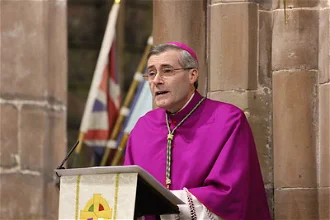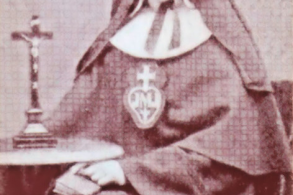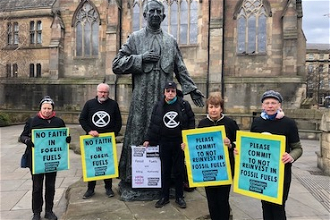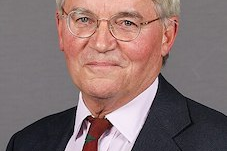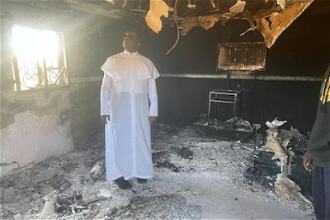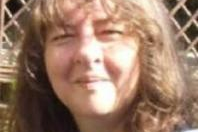Bishop Davies: Time to shine light in 'darkness' of the digital world
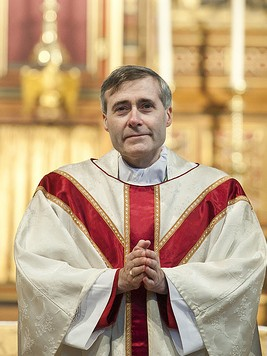
Bishop Mark Davies
The internet should be subjected to the same rigorous standards of regulation as the Press to prevent the corruption of the young and the damaging spread of so-called "fake news", the Bishop of Shrewsbury said in his Christmas homily given at Midnight Mass at Shrewsbury Cathedral. The Rt Rev Mark Davies said that the "Good News of Christmas" stands in contrast to the falsehoods that can sometimes characterise social media.
He repeated the concerns of Pope Francis that there is something sinister about the ease with which such falsehoods are transmitted through universal and unregulated social media, and how they invariably "set people one against another".As social communications reshape society with "an endless flow of words and images", the "viral and volatile" digital world was becoming a place where people were being "threatened, exploited, addicted and misled", the Bishop said.
He noted that none of the structures or regulatory safeguards that have evolved to ensure justice, decency and the dissemination of the truth in the Press and other mainstream media exist within social media and online communications. As a result, serious online abuses - including grave threats to the innocence of children - are at present allowed to go largely "unchecked and unchallenged."
Bishop Davies suggested that the introduction of a regulatory framework is required to eliminate the damaging effects of the internet and to place social communications fully at the service of the common good of society.
He said: "Christmas might be a time for us to consider the news environment that is now shaping our society in the endless flow of words and images of the digital world. The internet, which has a great potential for uniting and informing, can now be a place where people are threatened, exploited, addicted and misled. Pope Francis has reflected on the darkness found in this digital world that has become a place where fake news and misinformation - contemporary expressions for telling lies - can run unchecked and unchallenged. The centuries of experience and self- regulation that have underpinned a free Press are absent from this viral and volatile world on which people increasingly rely for news and to form judgements. Pope Francis notes there is something sinister about fake news which is invariably bad news that seeks to set people one against another."
"As a society we have need to reflect how this digital world can be brought to serve the common good, protect the innocence of children, and fulfil the duty of serving truth and avoiding falsehood in sharing news ... each of us needs to act, conscious of how the digital media forms part of our daily environment and especially that of the young. We need to take control of the messages and images which flow into our homes, and establish the disciplines which will enable digital technology to serve what is good."
The full homily text follows:
In churches across this land, the Christmas celebration begins in the midst of the night. The Gospel records how Christ was born in the darkest hours coming as the dawning light Isaiah foresaw (cf. Is 9:1). As the world slept and shepherds kept watch, this was how "the kindness and love of God our saviour were revealed" (Titus 3:4). And in the silence of those same hours of night, news of great joy broke upon the world: "a joy to be shared by the whole people ... that today a saviour is born to you" (Lk. 2: 10). It is this good news, of a saviour born for us that has shaped our history and continues to inspire what is best in us.
Christmas might be a time for us to consider the news environment that is now shaping our society in the endless flow of words and images of the digital world. The internet, which has a great potential for uniting and informing, can now be a place where people are threatened, exploited, addicted and misled. Pope Francis has reflected on the darkness found in this digital world that has become a place where fake news and misinformation - contemporary expressions for telling lies - can run unchecked and unchallenged (Cf. Message for World Communications Day 2017). The centuries of experience and self-regulation that have underpinned a free press are absent from this viral and volatile world on which people increasingly rely for news and to form judgements. Pope Francis notes there is something sinister about fake news which is invariably bad news that seeks to set people one against another. How different is the Good News of Christmas that serves to bring people together and leads us to open our hearts in recognition of the stranger and outsider, forming us to be a people with no ambition "except to do good" (Titus 3:4).
As a society we have need to reflect how this digital world can be brought to serve the common good; protect the innocence of children; and fulfil the duty of serving truth and avoiding falsehood in sharing news. I have been happy to join voices in calling for greater protection for children, and for internet providers to take account of their responsibility to limit the damaging ways in which the internet is used. However, each of us needs to act, conscious of how the digital media forms part of our daily environment and especially that of the young. We need to take control of the messages and images which flow into our homes, and establish the disciplines which will enable digital technology to serve what is good.
Used well, the internet connects and brings us closer one to another. A striking example is among the increasing number of visitors to Shrewsbury Cathedral are those who now visit the Cathedral each night via the Internet. People make this journey remotely to Town Walls from across the country and around the globe, to keep watch in prayer or simply to find peace. Pope Francis has described the digital highway as "A street teeming with people who are often hurting, men and women looking for salvation and hope ... Keeping the doors of our churches open also means keeping them open in the digital environment so people - whatever their situation in life - can enter, and so that the Gospel can go out to reach everyone" (World Communications Day 2014). Our night-time visitors along the digital highway see only one, bright point of light in the Cathedral: the sanctuary lamp pointing to Christ's presence among us. Amid the shadows of our time Christmas leads us all back to this Light that can never fade or mislead: "A light which shines in the darkness, a light which darkness cannot overcome" (Jn. 1: 5).
+ Mark Bishop of Shrewsbury



